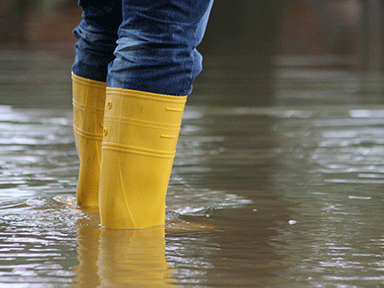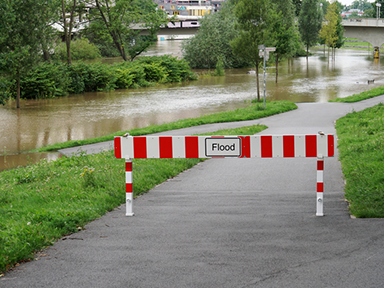If you own or manage a rental property, the prospect of it being damaged by a natural disaster can be frightening. Of course, there are things you can do to prepare for the ongoing environmental changes. However, sometimes, things are outside of your control.
If you ever find yourself having to respond to or make a claim following a bushfire, cyclone, flood or storm, we can help. Below, we answer FAQs which look at how to respond in times of natural disasters…
What exactly is a natural disaster?
Natural disasters, also referred to as natural catastrophes, are extreme, sudden events caused by environmental factors such as storms, floods, fires, and cyclones. Natural disasters are now happening with increasing severity, scope and impact.
Do landlord insurance policies offer cover for natural disaster damage?
The right insurance policy means owners can protect their investment, at least financially, against a range of natural disasters. Our RentCover Ultra and Platinum policies offer cover for damage to contents caused by Mother Nature, including: bushfire, storm, flood, earthquake, tsunami and cyclone.
When planning insurance, check if your policy includes the events that are most likely to happen at your property.
NOTE: Some environmental conditions are uninsurable, for example when the damage or loss does not result from a single ‘insured event’, such as in cases of coastal erosion where the problem develops over time.
How do natural disasters impact cover?
During and following a natural disaster, policyholders who had cover in place prior to the event are covered according to the terms and conditions in their product disclosure statement (PDS) and cover summary. Unless an exclusion or specific condition applies, natural disasters do not alter any of the existing terms and conditions in an active landlord insurance policy.
What should landlords do if they are impacted by a natural disaster?
In a nutshell, landlords (or their property manager) should:
-
Do a safety walkthrough (if you have been given access to your property and told it is safe to enter) and take steps to prevent further loss or damage.
-
Contact the insurer – as soon as the insurer knows there is an issue, the sooner they can help.
-
Take photos and capture evidence of the damage and loss.
-
Seek quotes for repairs.
-
Get a report from the repairer.
-
Submit a claim.
For a more detailed step-by-step guide for submitting claims during natural disasters, click here.
When should a landlord notify their insurer that their property has been impacted by a natural disaster?
It is recommended that landlords contact their insurer as soon as possible to let them know if their property has been impacted by a natural disaster. Even if the full extent of the damage is not known, insurers can advise on the claims process and may have resources to support landlords during what is a challenging time.
After a natural disaster, when can a landlord return to their property?
Landlords should avoid entering a home that is impacted by a natural disaster until emergency services gives the go-ahead and deems the property safe to enter.
TIP: If water has entered the property (in the event of a storm or flood), electricity should be left off until it has been inspected by an electrician. Landlords should also never step into a flooded basement or room if water may be in contact with electrical outlets, appliances, or cords.
What documentation is needed to submit a claim?
To submit a landlord insurance claim, the following documentation is typically required:
-
A completed claim form.
-
Photos and evidence of the damage and loss.
-
Quotes for repairs (at EBM RentCover, generally we require two quotes to be provided for repairs, but we understand this may be difficult during catastrophic events. So, we require just one in the first instance.)
-
A report from the repairer (causation report).
-
Receipts for any work or materials purchased.
NOTE: The above is a general list, and the insurer may require further information to substantiate a claim.
What happens after a landlord has submitted a claim?
The insurer will work through the claim to determine the loss and how the policy will respond. In major claims, loss adjusters may be assigned to evaluate the event. What is a loss adjuster? Essentially, they work out what has been damaged and needs to be fixed or replaced under the terms and conditions of an insurance policy. They prepare a recommendation to the insurer that examines the circumstances and legitimacy of a claim. If a loss adjustor is appointed to work through a claim, the insurer will let landlords know at the beginning of the process and keep them regularly updated about their progress.
For more information about the role of a loss adjustor, click here.
Can landlords take out cover in areas impacted by a natural disaster?
If a natural disaster is occurring (or imminent), the chance of it impacting an insured property, resulting in a claim being lodged, is much higher. Therefore, insurers reserve the right to place embargoes on cover. They are ultimately used to manage risk and prevent insurance from being purchased or altered when an event is known to be extremely likely or is already having an impact.
To determine if insurance can be taken out at a particular property at a particular time, contact the insurer. Or, for more information about embargoes, click here.
What other support can landlords seek during a natural disaster?
The below state services can help in times of need:
-
New South Wales State Emergency Service – https://www.ses.nsw.gov.au/
-
Queensland State Emergency Service – https://www.qfes.qld.gov.au/about-us/frontline-services/state-emergency-service
-
Victoria State Emergency Service – https://www.ses.vic.gov.au/
-
Tasmania State Emergency Service - https://www.ses.tas.gov.au/
-
ACT Emergency Services Agency - https://esa.act.gov.au/state-emergency-service
-
Western Australia Department of Fire and Emergency Services – https://www.dfes.wa.gov.au/aboutus/operationalinformation/Pages/stateemergencyservice.aspx
-
The Northern Territory Emergency Service – https://pfes.nt.gov.au/emergency-service
-
South Australian State Emergency Service – https://www.ses.sa.gov.au/home/
Got a question that hasn’t been answered above? Feel free to contact EBM RentCover’s Expert Care team on 1800 661 662 to discuss cover and claims.
*While we have taken care to ensure the information above is true and correct at the time of publication, changes in circumstances and legislation after the displayed date may impact the accuracy of this article. If you need us we are here, contact 1800 661 662 if you have any questions.
You may also like
View all
We highlight five of Australia’s costliest natural disasters and how they changed insurance cover...

Knowing how to respond in times of disaster makes the claims process easier and helps to minimise financial and emotional stress...

The frequency and severity of natural disasters in Australia is increasing. Here are things landlords can do to protect their investment...



